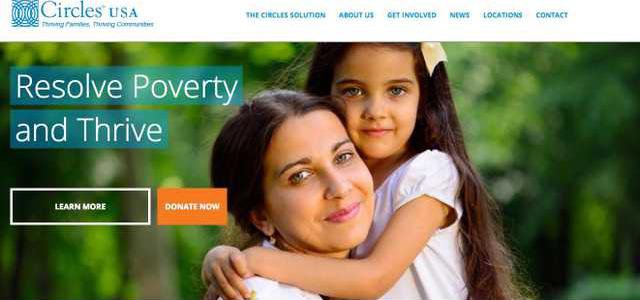It's a common problem for those trying to climb out of poverty that the more money they make, the more they lose.
That's because public assistance falls as a person's income reaches a certain levels and things like SNAP food assistance, childcare, and public housing are shut off. Sometimes, making just a little more money — less than $100 per month — can result in the loss of hundreds of dollars worth of assistance. Suddenly people making a little more can't make ends meet, and might be driven back under the poverty line.
Getting poor families past this "cliff" is where a program called Circles enters. Circles matches poor families with middle and upper-income families that act as volunteer support "allies" offering financial and budgeting help, and navigating schools and bureaucracies. The idea is to offer long-term help that offers personal attention rather than short-term, stop-gap measures.
Cara Russo, 34, of Gettysburg, Pennsylvania, is raising two daughters, ages 15 and 9. Like many people living under the poverty line, Russo is a single parent. Russo told NPR she lost her assistance benefits when she left her waitress job for two higher-paying jobs. Her Circles allies helped her pick up her kids from daycare and created a community food program for parents like her that can't get food stamps, but go hungry.
"It wasn't like they were giving me anything to be there except for the strength to be able move to the next week," Russo told NPR. Now, seven years later, Russo earns $55,000 a year and she's an ally for another struggling family.
The Circles project developed from a 1995 program in Iowa that matched families with support groups to get them off welfare. Circles began piloting programs in 2003 and now operates in 23 states from its base in Albuquerque, New Mexico.
The gains are impressive — studies have shown that Circles participants double and even triple their income. About 64 percent of participants finished the 15-week Getting Ahead course and improved their earnings by 28 percent just in that time, according to a 2012 Stanford Social Innovation Review report.
Progress is slow and takes time, however, as Circles programs only admit 25 participants at a time.
"To deal with everything that’s going on in a person's life is a slower process than to provide them with a magic bullet, which we don't have," founder Scott Miller told SSI Review. "But if you can get 25 families out of poverty, through that process you'll reveal systematic problems and you can see how to start revamping the system."
Email: laneanderson@deseretnews.com
Support from volunteer 'ally' families pull poor out of poverty





